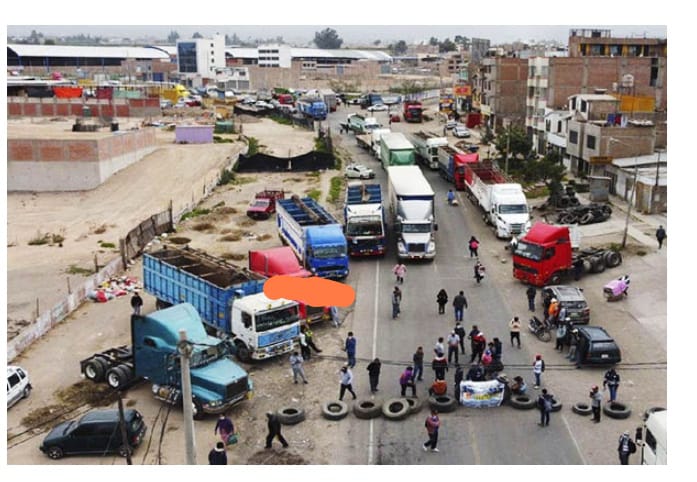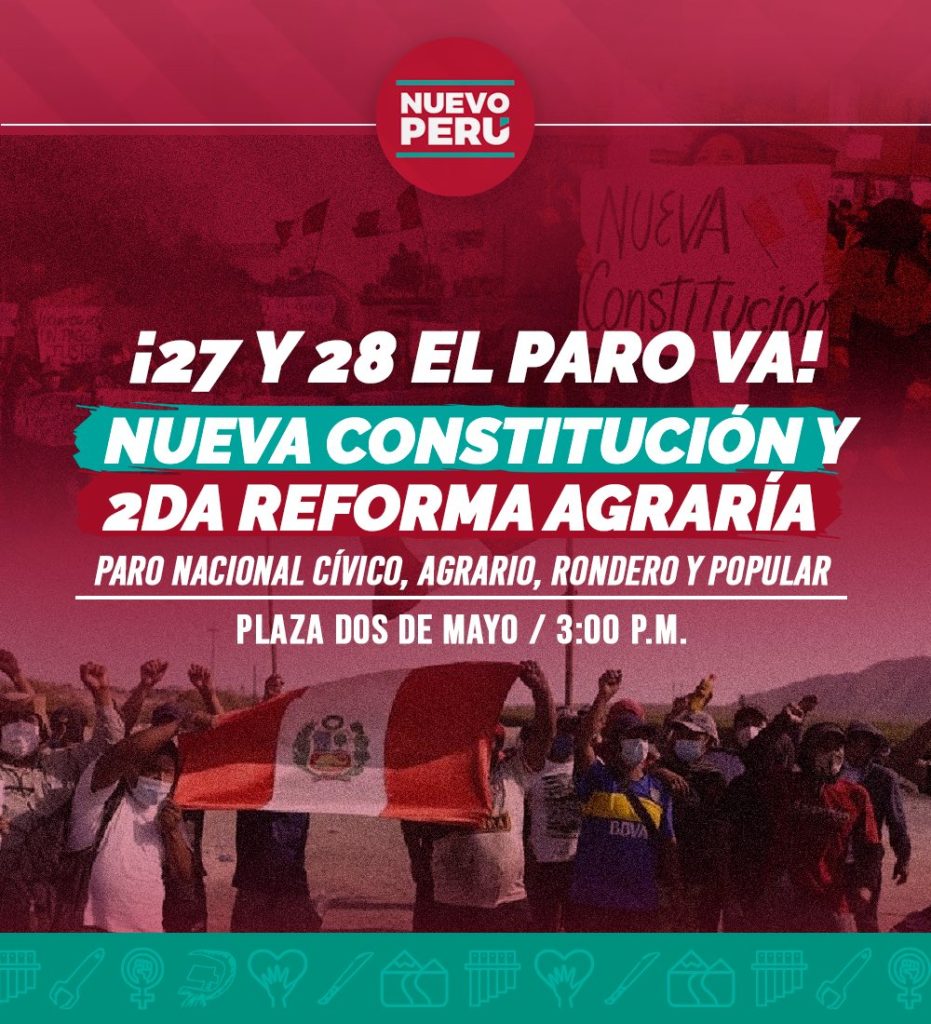Por Sofía Martínez – Alternativa Socialista Perú
El Perú sigue padeciendo de una crisis orgánica del Estado con una descomposición de sus instituciones agudizada por la ruptura del equilibrio de poderes. Por un lado, tenemos un Congreso golpista que no pierde oportunidad para seguir arrinconando al Ejecutivo, y del otro lado, al gobierno de Pedro Castillo que sobrevive a manotazos. La presidenta del Congreso María del Carmen Alva no se ha cansado de deslegitimar al gobierno con sus incansables pedidos de vacancia, Pedro Castillo ha terminado disparándose a los pies con decisiones que han ido desde escuchar a su cambiante gabinete de las sombras hasta los actos de corrupción en los cuales se encuentra involucrado.
En unas semanas se elegirá una nueva Mesa Directiva del Congreso y la expectativa es que este cambio traiga por lo menos un contexto más democrático y menos intransigente del legislativo. En cuando al presidente, las esperanzas de que honre su palabra de maestro y retome los compromisos de campaña han quedado diluidas por esta gestión de supervivencia.
En medio de esta crisis, el gremio de transportistas anunció un paro indefinido que inicia el lunes 27 de julio y del cual se espera que impacte en la distribución y abastecimiento de alimentos a nivel nacional; de igual forma se anunció un paro agrario para los días 27 y 28 de junio, para lo cual se ha convocado a una movilización en Lima y provincias que contará con la participación de diversos gremios de agricultores y organizaciones sociales. A esto también se suma una marcha de uno de los gremios de maestros (SUTEP) convocada para el 28 de junio. Las exigencias del cierre del Congreso y de una nueva asamblea constituyente vuelven a recorrer las calles recordando que las demandas populares siguen sin atenderse.


¿Dónde está la izquierda peruana?
Pareciera que las diversas organizaciones que conforman la izquierda peruana aún no encuentran el camino que los lleve de regreso a los objetivos y banderas que alguna vez enarbolaron. Desde los 90s ha sido muy complicado que los partidos de izquierda se recompongan y todos los intentos, incluido el último liderado por Verónika Mendoza, han ido derrota tras derrota electoral. La izquierda peruana dejó de reconocerse ideológicamente como comunista o socialista e incluso hasta marxista y se terminó diluyendo en el amplio espectro de la definición “progresista”. Golpeada por el terruqueo y la estigmatización a sus creencias, símbolos y prácticas; retrocedió enormemente. La izquierda ideológicamente socialista sobrevive en la marginalidad; mientras la izquierda reformista lo hace dispersa en múltiples grupos, colectivos y organizaciones. La última esperanza del reformismo peruano era Nuevo Perú, que tras el golpe de la derrota electoral trató de concretar su inscripción ante el Jurado Nacional de Elecciones, meta que no pudo alcanzar y que frustró sus planes de consolidación. Ahora se abre un debate para toda la izquierda: regresar a conectarse con los sectores populares o dejar de existir.
Pero, ¿por qué cuesta tanto reconectarse con el pueblo?
Las prácticas políticas de la vieja burocracia peruana siguen más vivas y arraigadas que nunca, eso no les ha permitido tener una ubicación con las necesidades del pueblo y peor aún, ver las luchas y resistencias populares siempre desde afuera. En los últimos años la movilización de las masas ha tenido picos y logros inimaginables pese a caminar sin dirección clara y haber surgido de la espontaneidad; sin embargo, los nuevos liderazgos y las oportunidades de construcción política no fueron prioridad y se dejaron de lado valiosas oportunidades. La burocracia ve los problemas desde afuera e incluso a veces desde arriba, y en más de una oportunidad ha hecho gala de un total desprecio por el trabajo de bases con menosprecio o sectarismo.

Otro de los problemas de la izquierda peruana es que desde los 90s la construcción de partido se piensa solo desde lo electoral y no desde la perspectiva de combatir el sistema capitalista. Tampoco hay planes de construcción más allá del objetivo en urnas por lo que cada cinco años tras las derrotas, las organizaciones de izquierda suelen replantearse soluciones hacía la insistencia en nuevos procesos de inscripción electoral.
Un elemento principal es que este proceso de crisis de construcción va de la mano con una fuerte crisis de identidad, y justamente sea por confusión, miedo y hasta vergüenza, la identidad socialista quedó en el olvido.
Nueva Constitución: un camino por recorrer
La dictadura fujimorista que nos impuso la constitución del 1993 ha sobrevivido victoriosa más de tres décadas, posicionándose como una de las fuerzas políticas más importantes. La degeneración de las instituciones del Estado, la corrupción enquistada y la impunidad son la orden del día. Tienen un fuerte control en el Congreso, ponen y sacan jueces en el Poder Judicial (el Tribunal Constitucional es solo una muestra) y como ya se ha definido: no son un partido político sino una organización criminal, una mafia construida para delinquir capaz de asesinar porque gozan de impunidad para absolutamente todo. Los grupos de extrema derecha son solo una extensión más de la corrupción y son muy peligrosos pues ahora, tras el surgimiento del fascismo peruano, pasaron de los insultos a las agresiones físicas. El fascismo está al servicio de los golpistas, la llamada DBA (derecha bruta y achorada) pretende ahora cambiar 50 artículos de la constitución, y claro está que en el Congreso no se legisla a favor del pueblo sino que están ahí para hacer negocios.
Los medios de comunicación juegan un rol importante a favor del fascismo y los golpistas, el periodismo peruano no es objetivo ni imparcial. La información se difunde con demasiados controles y maquillajes como si estuviéramos viviendo en dictadura: omisiones, cortinas de humo, noticias falsas, etc.
Sin embargo, las necesidades del pueblo siguen vigentes, como el objetivo de una nueva asamblea constituyente y procesos como el chileno nos demuestran que eso no se hará solo recolectando firmas. Es necesario seguir incidiendo en la movilización popular y en ese camino seguir debatiendo de la forma más amplia y democrática posible.
El avance de conciencias no se dará si no se interviene en las luchas, para ellos es necesario empezar a construir una alternativa socialista peruana que realmente esté decidida a enfrentarse al sistema y derrotarlo. El horror de la destrucción capitalista está demostrado, lo ocurrido en pandemia y ahora con la amenaza de una nueva guerra mundial nos reiteran cual es la urgencia de organizarnos para luchar.




